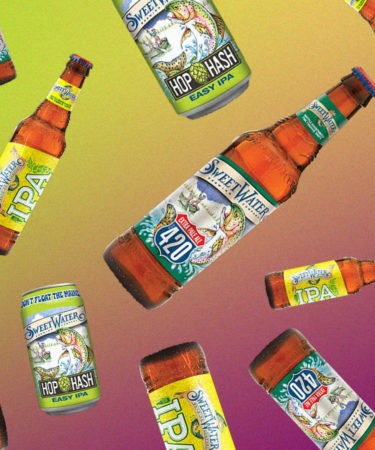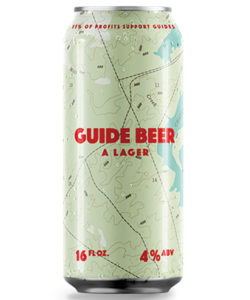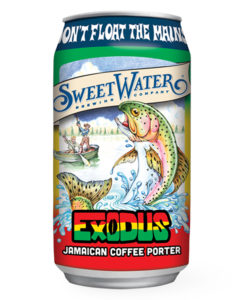West Coast-style beer first flowed into Atlanta when Freddy Bensch and Kevin McNerney opened SweetWater Brewing Company in 1997. The hoppy, resinous brews were heavily influenced by the co-founders’ previous brewing experiences in California and Colorado — along with a certain herb that’s popular there.
Starting out selling growlers out of an old Honda station wagon, and guided by the brand philosophy “don’t float the mainstream,” SweetWater made a splash on college campuses, and soon began flowing in Atlanta bars. The brewery has spent nearly a quarter-century crafting out-of-the-ordinary ales (and lagers) that ultimately secured it a spot among the top craft brewing companies in the U.S., at No. 14 as of 2020.
Ready to swim against the current? Dive in with these 12 things to know about SweetWater Brewing Company.
SweetWater brews with sticky herbs.
From its long running flagship, 420 Extra Pale Ale, to more recent labels such as Hop Hash Easy IPA and the limited-edition Fresh Sticky Nugs, there’s a clear thread throughout SweetWater’s hoppy, heady beers. (Hint: It’s weed.) It even has a special series of beers dedicated to the medicinal herb, with each beer made to harness the aroma, flavor, and theoretical vibes of various marijuana strains, naming each release according to its corresponding strain.
SweetWater’s weed-inspired series launched in 2018 with G13 IPA, designed to simulate the flavors of the marijuana strain of the same name. Brewed with Simcoe and Columbus hops, the beer also features G13-strain terpenes and hemp flavors. Four other beers later joined the series: Mango Kush Wheat Ale, Trainwreck Hazy Double IPA, Super Silver Haze Lager, and Jack Herer Harvest Ale, named for a cannabis activist.
The 420 Strain Series is like a liquid family reunion.
Hops, or Humulus lupulus, are believed to share ancestry with Cannabis sativa (marijuana). Humulus and Cannabis are two genera in the family Cannabaceae. Both share similar scents and tastes, and SweetWater has been determined to celebrate this heady connection.
(Disclaimer: The ingredients only lend to flavor and aroma. Since there’s no THC, no one’s getting high off the 420 Strain Series. That’s either good news or bad news depending on how you look at it.)
SweetWater arrived in Atlanta with Olympic-level expectations.
Bensch and McNerney met while attending the University of Colorado and scrubbing kegs at local breweries. They graduated and parted ways, Bensch going to California to study brewing and McNerney taking up brewing jobs around Colorado. A few years later, in the summer of 1996, Bensch packed his dog and everything he owned into his van and drove to Atlanta. The city was preparing for the Olympic games, an epic event that made the city shine.
The buzz of activity around the Olympic games appealed to Bensch, who saw an opportunity to bring West Coast-style craft beer to a new corner of the country that had not been exposed to it. While there were a few small breweries operating in the city at the time, the craft beer scene was still pretty fresh — and open to possibilities. He called up McNerney and told him to come east so they could open a brewery. McNerney made his way to Atlanta, and the pair started building out the space to open less than a year later.
Its flagship docked on a special date.
For three and a half months, Bensch and McNerney brewed up a storm. But they had to wait for the perfect day to brew what would eventually become their flagship pale ale: April 20, 1997. Bensch and McNerney brewed 420 Extra Pale Ale with Cascade and Centennial hops, two hop varietals that originated in the Pacific Northwest that deliver floral, herbal, and fresh aromas and flavors. They doubled down by dry-hopping — remember, this was almost 25 years ago — amplifying the aroma with Cascade hops to add a bit of citrus to the mix.
The flavorful but easy-drinking brew grew in popularity fast. By 2002, it had earned a silver medal at the Great American Beer Festival, which hosts the largest beer competition in the country.
SweetWater to the rescue?
The original brewery opened in a West Atlanta warehouse located on Fulton Industrial Boulevard. The space had previously served as a 911 emergency dispatch center. That meant, for one, they probably had to sage the place. Other than that, there was a lot to do to turn it into a fully operational brewery.
Bensch, McNerney and their first employees got their hands dirty building out the location. Whatever they could do themselves, they did it. They installed plumbing, set up the glycol, and even wired the electrical system. It took a lot of hard work but Bensch, McNerney and their small team pulled it all together in time for their first brew in January of 1997.
Save water, drink beer.
All brewers need good, clean water. Bensch, who studied environmental sciences at the University of Colorado — and then, you know, named his brewery after a local waterway — is keenly aware of this. That’s why in 2006 SweetWater launched its Save Our Water initiative, partnering with nonprofits like Waterkeeper Alliance to raise money toward protecting rivers, bays, sounds, and other bodies of water locally and around the country.
In 2019, the brewery crafted a summer seasonal, Kick Plastic Lager, in collaboration with Costa sunglasses, as a way to raise money for water conservation groups. A percentage of profits from the beer’s sales went to Waterkeeper Alliance, Coastal Conservation Association, and Trout Unlimited.
‘Stop that truck! They stole our beer!’
In 2016, a thirsty thief stole two full trailers of SweetWater beer. They basically just drove off with them from the brewery’s parking lot early one morning and nearly got away with 3,300 cases of 420 Extra Pale Ale, SweetWater IPA, Goin’ Coastal IPA, and Take Two Pils.
Thanks to GPS tracking, the brewers were able to locate the trailers: one at another warehouse while the other was at a private home; both were empty. Eventually, with help from Atlanta police, about 20,000 of the missing 78,000 bottles were found. All of it had to be dumped, unfortunately, since no one knew where that beer had been. The rest of the missing beer was never found so either someone drank 58,000 bottles of beer themselves or they had a heck of a party.
Some beers stay fresh nugs, others grow into trees.
When SweetWater expanded its brewery in 2016, it made room for The Woodlands Project, a barrel-aging program that allows brewers to experiment with aging beers in giant oak casks called foeders (pronounced foo-der). That facility, located right next to the production brewery, houses six of these, each designed to hold 88 hectoliters (about 2,325 gallons). All together, the towering barrels are capable of aging almost 13,950 gallons of what will eventually become funky-fresh sours and Belgian-style farmhouse ales. (There are also hundreds of other regular-sized barrels in the “woodlands.”)
Six limited-release brews, including Sinner’s Son, a bourbon barrel-aged imperial stout, and Through the Brambles, a blackberry sour, have come from The Woodlands thus far.
A kayak trip inspired the brewery’s name.
During his initial visit to Atlanta, Bensch says he found inspiration while kayaking down a creek. It was (wait for it) the Sweetwater Creek, a tributary to the Chattahoochee River. He chose to name the brewery after the creek, and to camel-cap the “W” in the brand name, to emphasize the very precious ingredient used to brew their beer: water.
Sweetwater Creek State Park, located where the creek flows past the George H. Sparks Reservoir, is a destination for fishing, hiking, and kayaking. It’s located just a few miles from the brewery’s original location.
What’s with the fish?
It’s a rainbow trout, actually, and his name is Trouser. Bensch and McNerney, and many of their early employees, spent a lot of their time together fishing and drinking beer. So when it was time to design labels for the beers they brewed, it made sense to plaster an image of their favorite fish on the bottle. To this day, most of SweetWater’s packages feature a rainbow trout in some form or another. Believe it or not, the fish also has its own theme song.
SweetWater throws a massive, grassy festival every year.
SweetWater hosted its first 420 Fest in 2004, headlined by jam band Tea Leaf Green. Every year since then, the brewery has invited fans from far and wide to join in on the fun on or around April 20 (420). The event takes place at Centennial Olympic Park and draws more than 50,000 people each year, according to the Atlanta Business Chronicle.
The 2020 festival has been canceled but SweetWater has already scheduled the next 420 Fest for April 23 through 25, 2021.
‘SweetWater, with a splash of SweetWater, please.’
In early 2020, SweetWater confirmed that the brewery is looking to get into the booze business. The brewery got its liquor license approved, which gives it the ability to craft and sell spirits from its current location. What and how SweetWater will be distilling is still to be determined.


